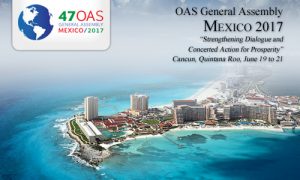In last week’s post, I made a brief reference to the current situation in Venezuela which has gone from bad to worse over the last few months. The combination of the drop in oil prices, the death of the charismatic Hugo Chavez and the appointment of his corrupt and hapless successor, Nicolás Maduro, has left the country beyond the point of collapse.
For a perspective on what is happening in the country, I recommend the blog, twitter, and instagram of Daniel Duquenal who has been faithfully reporting from Venezuela since Chavez came to power and has a clear view of the decomposition of the Maduro regime. How this man has found the courage, perspective, and the time, to continue to provide insight into the crisis that has befallen his country is beyond me but it is people like him who really show the power of our modern communications infrastructure, especially when dealing with tyrants.

The thing is that in the latest wave of protests have lasted more than three months, left almost 50 protesters dead, and is finally causing a split within the regime. Last week, the Chief Prosecutor, something like the Attorney General, Luisa Ortega Díaz, called on citizens to rise up against the government as reported in the Guardian. Ms. Ortega is reportedly a die hard Chavez supporter but has come to see the Maduro regime as a Mafia State, only interested in staying in power and keeping its leader out of prison.
Writing about the drop in oil prices in February 2015, I posted that “it was hard to see how Maduro’s government will survive” and the sad truth is that has done so through repression that Duquenal thinks has been ordered by Cuba. Another player may be China which has lent perhaps as much as $ 60 Billion to Venezuela since 2014. Writing in Foreign Affairs, Ander Corr, who runs a geo-political consulting company argues for external intervention in Venezuela. He reports that the Chinese loans were not approved by the country’s legislative branch and would thus be null and void if the regime would fall from power. Would China actively intervene in Venezuela to protect its investments? This would make sense to me.
James Monroe and Teddy Roosevelt
In his annual speech to the Congress in 1823, U.S. President James Monroe made explicit reference to the newly independent states of South America and the role that France played in restoring the deposed Ferdinand VII to power in Spain.
Making reference to the European system of monarchies and alliances he emphatically stated that “we should consider any attempt on their part to extend their system to any portion of this hemisphere as dangerous to our peace and safety”. This idea became known as the Monroe Doctrine and has been a fundamental tenant of American foreign policy ever since.

It was later extended by Teddy Roosevelt to embrace the idea that the Unites States would intervene in the internal affairs of countries in the Hemisphere in “flagrant cases of such wrongdoing or impotence”.
Venezuela has clearly passed the point of incompetence and it may be time for american intervention in order to save he Venezuelan people fro its government which no longer recognized the sovereignty of its national assembly. The problem with this approach if the initial attack were to fail, the U.S. might find itself in a drawn out guerrilla war and could end up creating sympathy for Maduro and his gang.
Maybe the OAS ?
With its roots in multilateral conferences dating back to the 1890’s, the Organization of American States has been the primary vehicle of coordination cross the countries of the Western Hemisphere. Founded at a conference in Bogotá in 1948, the organization was established in Washington and the objective of the OAS was to initially encourage regional security cooperation. Over time economic and social development, the protection of human rights, and the promotion of democratic government have been added to its core objectives through a series of agreements and charters.
 The OAS started its General Assembly Meeting today in Cancun. While it is extremely unlikely, perhaps the best thing would be for an expeditionary force from OAS members not including the U.S. to occupy Caracas, imprison Maduro and restore power to the Venezuelan Assembly.
The OAS started its General Assembly Meeting today in Cancun. While it is extremely unlikely, perhaps the best thing would be for an expeditionary force from OAS members not including the U.S. to occupy Caracas, imprison Maduro and restore power to the Venezuelan Assembly.


As the death toll rises above 70 in Venezuela, the OAS was not even able to pass a resolution condemning the Maduro regime!